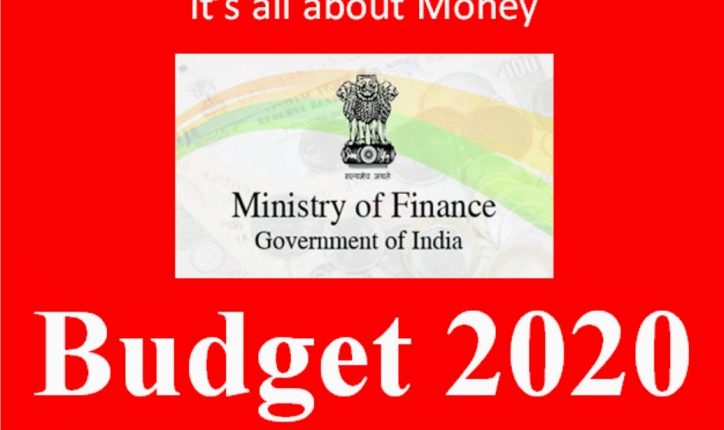NEW DELHI: Battling a 6-year low economic growth and 45-year high unemployment rate, the Narendra Modi government has a daunting task ahead in the upcoming Union Budget 2020, which the corporate world including countries like Japan, Korea, China, and others are anxiously looking at.
Facing the flak for not delivering enough to revive the ailing economy in her last year’s budget despite taking mid-term measures like slashing corporate tax rate by almost 10 percent to bring at par with Asian countries, and lowering GST rates on several items, India’s finance minister Nirmala Sitharaman is going to present Budget 2020 on February 1.
Not content with the earlier measures, the corporate world expects Sitharaman to do more for reviving the market sentiments and rebuilding the confidence of domestic and foreign investors, especially the SMEs and Startups, and dole out some largesse in the Budget 2020.
Some of the concerns the corporate taxpayers expect the upcoming budget to address include Relief to companies undergoing restructuring from the taxman’s gaze, Carryover of Unclaimed MAT credit, Clarification on availability of extended period for MAT credit, Insertion of Power Generating units to the definition of ‘Manufacturer’, Uniformity in tax rates for Companies and Non-Company Business Entities, Increase in turnover limit of Start-ups to claim the benefit of tax holidays under section 80-IAC, Tax treatment for waiver of loan taken for an asset, Tax treatment for waiver of loan taken for an asset, Power generating units – Depreciation rate on intangible assets, Clarifications on deductibility of discounts in case of ESOPs, and Non-Compete fee.
In an interview with Asian Community News (ACN) Network, Atul Puri, Partner, ShineWing India – an Indian arm of ShineWing International, a global network of independent accounting and consulting firms worldwide, said that it would be interesting to see how the Budget 2020 addressed the concerns of the corporate taxpayers.

Puri said there was an urgent requirement for the relief for companies undergoing restructuring from the taxman’s gaze, thus a clarity was sought on the allowance of Depreciation on Goodwill.
“The Supreme Court in one case held that the goodwill arising on an amalgamation of companies would be eligible for depreciation as it is covered under Explanation 3(b) to Section 32(1) under the expression ‘any other business or commercial rights of a similar nature’. However, the taxmen with the desire to collect more revenue are at the expense of the Rule of law, are continuously targeting companies undergoing restructuring and recording goodwill as purchased goodwill,” added Puri.
“Thus, we expect the amendment to the definition of the intangible asset [as provided in the Explanation 3(b) to Section 32(1)], which should include purchased goodwill, i.e., goodwill arising on an amalgamation of companies, for the purpose of depreciation on intangible assets.”
Likewise, Atul Puri raised the following issues pertaining to corporate taxpayers.
Concern: Carryover of Unclaimed MAT credit when a company opts out under new tax regime u/s section 115BAA
Pursuant to insertion of new section 115BAA by the Taxation Laws (Amendment) Act, 2019 to provide concessional tax regime in case of domestic companies, where, a domestic company has an option to pay tax at the reduced rate of 22% provided it does not claim specified deduction or allowances. If a company opts for this tax regime, then it shall get immunity from MAT liability. A consequential amendment was also made to Section 115JAA that the provisions relating to MAT credit shall not apply to a company opting for section 115BAA.
ShineWing’s take: Such legal hurdle may arise due to the language of sub-section (8) of Section 115JAA which bars a company for forever, once it opts for Section 115BAA. To avoid any harsh treatment of such companies, we expect that, the provision of said sub-section should be re-drafted and allow set-off of unclaimed MAT credit in subsequent years.
Concern: Clarification on availability of extended period for MAT credit
ShineWing’s take The Finance Act, 2018 has extended the period for which MAT credit can be carried forward from 10 years to 15 years. However, it has not been clarified whether the extended period would be applicable even in those cases where an original period of 10 years has already expired before the date on which such provision came into force. Thus, it is recommended that the forthcoming budget should bring clarity to this issue.
Concern: Insertion of Power Generating units to the definition of ‘Manufacturer’
The definition of Manufacturer, no-where includes specifically that power generating units fall within the ambit of the manufacturer. This ambiguity has led to litigations where the tax authorities are not accepting depreciation claim under section 32(1)(i) for power generating manufacturing units and creating frivolous demands.
ShineWing’s take: Further, with introduction of new section 115BAB by the Income Tax Amendment Ordinance, 2019, where special tax rate has been offered to new domestic manufacturing company, it is very much pertinent to have a clear definition of manufacturer for this purpose in order to avoid any ambiguity and legal litigation at a later stage. Thus, we expect the insertion of the word ‘Power Generation Units’ to the definition ‘Manufacturer’.
Concern: Uniformity in tax rates for Companies and Non-Company Business Entities
For the Assessment Year 2020-21, the Government has introduced two new tax concessional regimes u/s 115BAA and 115BAB in case of domestic companies wherein tax rates have been reduced to 15% and 22% in case of manufacturing companies and non-manufacturing companies, respectively. However, all other business entities, i.e., partnership firm, LLPs, etc. are still taxable at a flat rate of 30%.
ShineWing’s take: We expect that the government should extend the benefit of the reduced tax rates to other business entities as well.
Concern: Increase in turnover limit of Start-ups to claim the benefit of tax holidays under section 80-IAC
The Department of Promotion of Industry and Internal Trade (DPIIT) has issued notifications to increase the turnover threshold of an eligible start-up for not exceeding Rs. 100 crore in any of the financial year since its incorporation or registration.
However, the benefit provided under section 80-IAC for claiming the benefit of the tax holiday, the turnover of an eligible start-up should be up to Rs. 25 crores. The provisions of section 80-IAC and notification issued by DPIIT are not in harmony with each other.
Further, the Central Board of Direct Taxes (CBDT) in the press release dated 22-08-2019 had clarified that the turnover limit for start-ups claiming the deduction is to be determined by the provisions of Section 80-IAC of the Act and not from the DPIIT notification. Thus, small start-ups with turnover up to Rs. 25 Crores will only get tax holiday available under section 80-IAC.
ShineWing’s take: It is recommended that the Govt. should increase the turnover limit for claiming section 80-IAC benefit in line with the notification issued by DPIIT.
Concern: Tax treatment for waiver of loan taken for an asset
With the continuous ambiguity in present law for taxability of waiver of loan taken for an asset, many higher courts including the Apex court have pronounced their rulings that waiver of loan does not amount to the cessation of trading liability. The Supreme Court in the case of CIT v. Mahindra and Mahindra Ltd. [2018] 93 taxmann.com 32 (SC) held that waiver of loan for acquiring capital assets cannot be taxed under section 28(iv) as receipt in hands of debtor/assessee and it also cannot be taxed as a remission of liability under section 41(1) a waiver of loan does not amount to cessation of trading liability.
ShineWing’s take: It must be clarified in the upcoming Finance Bill that waiver of loan taken for acquisition of a capital asset would be considered as income as per section 2(24).
Concern: Power generating units – Depreciation rate on intangible assets
The Income-tax (Amendment) Act, 1998 has provided an option to the undertakings engaged in generation or generation and distribution of power to claim depreciation by using the straight-line method by insertion of section 32(1)(i).
However, Income-tax Rules, 1962 doesn’t provide for any rate of depreciation on the Intangible assets on a straight-line basis. Thus, power generating units have the option of claiming depreciation under the SLM method only in respect of tangible assets.
ShineWing’s take: We are expecting a clarificatory amendment in Appendix IA of Income Tax Rules, 1962, to bring out more clarity.
Concern: Clarifications on the deductibility of discounts in case of ESOPs.
Taxability of ESOPs has always been a controversy for such a long period and some of the recent judicial pronouncements suggest that the tax fraternity is grappling with the controversy on the tax treatment of the discounts on the shares issued to the employees under ESOPs.
Companies issuing ESOP’s argue that the primary object of an ESOP is not to raise share capital but to earn profit by securing the consistent and concentrated efforts of its dedicated employees during the vesting period. Therefore, such a discount should be construed as nothing but a part of remuneration. Such a discounted premium on shares is a substitute for giving direct incentives in cash for availing of the services of the employees.
Conversely, the revenue has been contending that the said discounts can never be allowed as deductions on the grounds that the discount offered under ESOP is not in the nature of expenditure and such discount is not given in the normal course of a business carried on by the Company. Hence, it only represents a short receipt of premium on the issue of shares. If the receipt of the premium is not taxable, the short receipt of such premium should also not be allowed as deduction.
ShineWing’s take: In order to avoid unnecessary litigations, it would be prudent for the Finance Minister to clarify this stand on the tax treatment of discounts on the issue of shares under ESOP. With the ongoing ambiguity and increasing litigation, we expect clarity on the tax treatment of discounts on ESOP scheme, that it should be amortized over the vesting period.
Concern: Non-Compete fee to be capitalized
Under the present Income tax system, there is no provision for the treatment of payment made for a non-compete fee. Many litigations have arisen where assessee’s claim that such payment shall be capitalized in the books as an intangible asset as it would provide not only an enduring benefit but would protect the assessee’s business against competition. Hence, the assessee can claim depreciation on the amount so capitalized.
ShineWing’s take: Clarification should be brought out under the Act, to specifically provide that payment forwarding off competition can be capitalized, and hence, will become an intangible asset for the assessee upon which he can claim depreciation.



